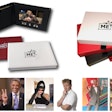When Brooke Shields was pregnant last year, her girlfriends could have pooled their pennies to throw her a baby shower. Instead, maternity fashion designer Liz Lange and Target (which carries her line) threw Shields an 80-guest party with a Lange fashion show and a giant sprawl of carnations on the lawn of a pal's Malibu estate spelling out "It's a girl!"-with a Target logo dotting the "i." Kitschy? Maybe. But marketing-minded? Definitely.
"The line between corporate and private events is so blurred nowadays. It might seem rude or tacky in other parts of the country, but in L.A. everyone's got something to sell," says event planner Cara Kleinhaut of Caravents. "Parties are the perfect way to market it."
No event is out of bounds for corporate sponsorship. Birthday parties, baby showers and weddings all qualify-provided the sponsor sees a marketing opportunity. Businesses are willing to donate gift bag items, favors, food, beverages or cash in exchange for product placement at an event because they want exposure to the guests who fit squarely into their target market: celebrities, entertainment industry bigwigs and otherwise rich attendees with high-level status and buying power to match.
"I'm getting a ton of calls from companies that want to be attached to celebrities," says Mindy Weiss, the event planner who coordinated Shields' shower, and is best known by now for her involvement in The Bachelorette's Trista and Ryan Sutter's estimated $3.8 million wedding, the quintessential corporate-sponsored, supposedly private event. "After the event, at least they can say something like, 'Jennifer Aniston was given one of our lipsticks.'"
Budweiser stocked a New Year's Eve party at Shaquille O'Neal's home. And Hangar One supplied liquor for the bar at O'Neal and actor Boris Kodjoe's joint birthday party for 300 guests at Studio City bowling alley Pins, for which gift company Buzz Bags put together a gift bag packed with products like Godiva truffles.
Sponsors also hope to maximize their investments when these events get coverage in print and on television, thanks to the invited reporters from People, Access Hollywood and other lifestyle press outlets. (Target scored with a three-page photo-filled feature of the Shields affair in In Style.)
"Corporations aren't going to do it unless it benefits their bottom line," says David Merrell, president of An Original Occasion, an event production company that has produced numerous private social events with marketing tie-ins. "Maybe the sponsor will get that one golden celebrity endorsement, or some other benefit. If they think they can measure some return on investment, they'll do it."
Spa and salon services by sponsors like La Mer and Frette are popular donations. Absolut, Piper-Heidsieck and Seagram's are a few of the many liquor sponsors known for their continued support of private events. Patron has even made private label tequila bottles for celeb parties. "It's actually less expensive than advertising and sometimes much more powerful of a marketing tool," says Beverly Hills gift company Les Cadeaux owner Harmony Walton, who commonly courts businesses to contribute products for party favors.
But what's in it for the hosts, who can afford to entertain without outside financial backing? "It's not illegal, it's not uncommon and it doesn't matter how much money you have. If you're handed something for free, you'll take it," Merrell says. "When someone has a high degree of money and status, they're handed gifts all the time."
Take Sharon and Ozzy Osbourne's televised wedding vow renewal ceremony, where attendees received gift bags full of donated products. Or Omar Epps' intimate fete for his pregnant fiancee, which featured leather gift bags donated by Kenneth Cole, filled with Dylan's candy, Ergo candles and Sundari skin care products. Guests at baby showers for an L.A. actress and a children's book publisher received gifts from Clarins. The list goes on, and more celeb hosts are catching on to the practice.
And why not? When celebrities receive gift bags valued at $100,000 for presenting at awards broadcasts, it stands to reason that they grow accustomed to such treatment-and might not be eager to give it up when they entertain privately. "The irony is that once you make enough money to afford life's luxuries," Walton says, "you don't have to pay for them."
—Alesandra Dubin
Photo illustration by Toni Lucatorto
"The line between corporate and private events is so blurred nowadays. It might seem rude or tacky in other parts of the country, but in L.A. everyone's got something to sell," says event planner Cara Kleinhaut of Caravents. "Parties are the perfect way to market it."
No event is out of bounds for corporate sponsorship. Birthday parties, baby showers and weddings all qualify-provided the sponsor sees a marketing opportunity. Businesses are willing to donate gift bag items, favors, food, beverages or cash in exchange for product placement at an event because they want exposure to the guests who fit squarely into their target market: celebrities, entertainment industry bigwigs and otherwise rich attendees with high-level status and buying power to match.
"I'm getting a ton of calls from companies that want to be attached to celebrities," says Mindy Weiss, the event planner who coordinated Shields' shower, and is best known by now for her involvement in The Bachelorette's Trista and Ryan Sutter's estimated $3.8 million wedding, the quintessential corporate-sponsored, supposedly private event. "After the event, at least they can say something like, 'Jennifer Aniston was given one of our lipsticks.'"
Budweiser stocked a New Year's Eve party at Shaquille O'Neal's home. And Hangar One supplied liquor for the bar at O'Neal and actor Boris Kodjoe's joint birthday party for 300 guests at Studio City bowling alley Pins, for which gift company Buzz Bags put together a gift bag packed with products like Godiva truffles.
Sponsors also hope to maximize their investments when these events get coverage in print and on television, thanks to the invited reporters from People, Access Hollywood and other lifestyle press outlets. (Target scored with a three-page photo-filled feature of the Shields affair in In Style.)
"Corporations aren't going to do it unless it benefits their bottom line," says David Merrell, president of An Original Occasion, an event production company that has produced numerous private social events with marketing tie-ins. "Maybe the sponsor will get that one golden celebrity endorsement, or some other benefit. If they think they can measure some return on investment, they'll do it."
Spa and salon services by sponsors like La Mer and Frette are popular donations. Absolut, Piper-Heidsieck and Seagram's are a few of the many liquor sponsors known for their continued support of private events. Patron has even made private label tequila bottles for celeb parties. "It's actually less expensive than advertising and sometimes much more powerful of a marketing tool," says Beverly Hills gift company Les Cadeaux owner Harmony Walton, who commonly courts businesses to contribute products for party favors.
But what's in it for the hosts, who can afford to entertain without outside financial backing? "It's not illegal, it's not uncommon and it doesn't matter how much money you have. If you're handed something for free, you'll take it," Merrell says. "When someone has a high degree of money and status, they're handed gifts all the time."
Take Sharon and Ozzy Osbourne's televised wedding vow renewal ceremony, where attendees received gift bags full of donated products. Or Omar Epps' intimate fete for his pregnant fiancee, which featured leather gift bags donated by Kenneth Cole, filled with Dylan's candy, Ergo candles and Sundari skin care products. Guests at baby showers for an L.A. actress and a children's book publisher received gifts from Clarins. The list goes on, and more celeb hosts are catching on to the practice.
And why not? When celebrities receive gift bags valued at $100,000 for presenting at awards broadcasts, it stands to reason that they grow accustomed to such treatment-and might not be eager to give it up when they entertain privately. "The irony is that once you make enough money to afford life's luxuries," Walton says, "you don't have to pay for them."
—Alesandra Dubin
Photo illustration by Toni Lucatorto




















